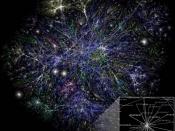Netspeak:An analysis of Internet jargon Approximately 30 million people world-wide use the Internet and online services daily. The Net is growing exponentially in all areas, and a rapidly increasing number of people are finding themselves working and playing on the Internet. The people on the Net are not all rocket scientists and computer programmers; they're graphic designers, teachers, students, artists, musicians, feminists, Rush Limbaugh-fans, and your next door neighbors. What these diverse groups of people have in common is their language. The Net community exists and thrives because of effective written communication, as on the net all you have available to express yourself are typewritten words. If you cannot express yourself well in written language, you either learn more effective ways of communicating, or get lost in the shuffle. "Netspeak" is evolving on a national and international level. The technological vocabulary once used only by computer programmers and elite computer manipulators called "Hackers," has spread to all users of computer networks.
The language is currently spoken by people on the Internet, and is rapidly spilling over into advertising and business. The words "online," "network," and "surf the net" are occuring more and more frequently in our newspapers and on television. If you're like most Americans, you're feeling bombarded by Netspeak. Television advertisers, newspapers, and international businesses have jumped on the "Information Superhighway" bandwagon, making the Net more accessible to large numbers of not-entirely-technically-oriented people. As a result, technological vocabulary is entering into non-technological communication. For example, even the archaic UNIX command "grep," (an acronym meaning Get REpeated Pattern) is becoming more widely accepted as a synonym of "search" in everyday communication. The argument rages as to whether Netspeak is merely slang, or a jargon in and of itself. The language is emerging based loosely upon telecommunications vocabulary and computer jargons,


